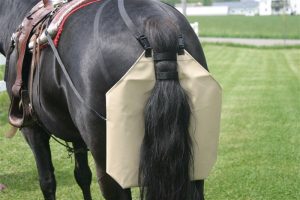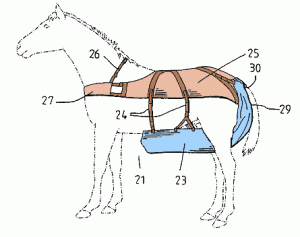Amish Farmer Raided (again)
Feb 23
AMISH FARMER RAIDED (again) 2024 | Pennsylvania Department of Agriculture v Amos Miller Organic Farm
PREVIOUS VIDEOS ON AMOS MILLER FEDERAL CASE:
https://youtu.be/JXfkX6_jM9g?si=Brcpq…
https://youtu.be/avyYvd_Ffs8?si=bjIKY…
CONTACT THE SHEPHERDESS: shepherdess(at)shepherdess.com
Videos Cited: https://www.youtube.com/watch?v=nRS7e…
https://www.youtube.com/watch?v=ZES2b…
https://www.youtube.com/watch?v=mHugZ…
https://www.youtube.com/watch?v=xfWk_…
Articles Cited:
https://www.thelancasterpatriot.com/p…
https://www.thelancasterpatriot.com/s…
https://www.thelancasterpatriot.com/s…
Assist with Amos Miller’s Legal Fees:
https://www.givesendgo.com/supportamo…
Timestamps:
0:00: Recap of Miller Organic Farm Federal Lawsuit
2:55: 2024 State Raids and Sues Miller Organic Farm in 2024
Pennsylvania: State Raids Amish Organic Farm that Sells Raw Foods to Private Buyers
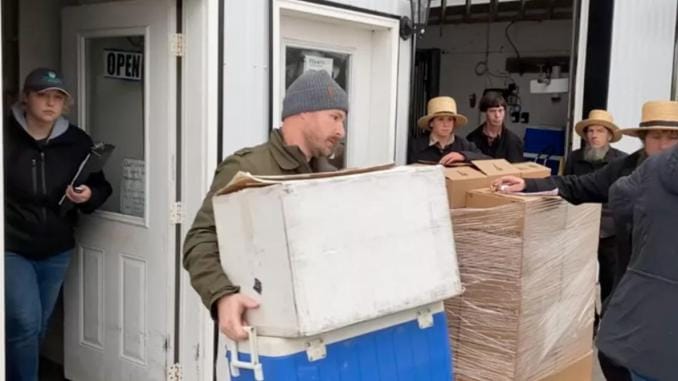
Pennsylvania State Troopers executed a search warrant and confiscated products at the Miller’s Organic Farm owned by Amish farmer Amos Miller. Miller’s all-natural farm, which only sells to people in its private member association (PMA), has been targeted by state and federal agencies in recent years for operating outside of agricultural regulations. The Millers do not pasteurize their raw milk, they don’t inject their animals with vaccines or other chemicals, and they don’t use fertilizer to grow crops. Raw milk from the Millers Organic Farm was blamed in 2016 for a listeria “outbreak” in 2014 that sickened one person in California and another in Florida, with the latter dying supposedly from the illness. Activists are concerned that the government is interfering in transactions between sellers of nutritious raw foods and private buyers who are in a private membership association (PMA) that operates in the private domain versus the public domain.
Footage out of Bird-in-Hand filmed by The Lancaster Patriot’s Chris Hume shows state agents executing a search warrant and confiscating products at the Millers Organic Farm owned by Amish farmer Amos Miller.
As reported by Hume on a GoFundMe page created in support of the Millers, “Under the watchful eye of Pennsylvania State Troopers, and the backing of a search warrant, agents of the state entered Amos’ property, spent hours inside his buildings, and then hauled off some of his products. The remaining products they are forbidding Amos from selling, effectively ending his business until further notice.”
While a precise reason for the latest raid has not been given, Miller’s all-natural farm, which only sells to people in its private member association, has been under the microscope of state and federal agencies in recent years for operating outside of agricultural regulations.
For instance, the Millers do not pasteurize their raw milk, they don’t inject their animals with vaccines or other chemicals, and they don’t use fertilizer to grow crops.
“The farm raises its animals and other pure foods the way nature intended and we are proud to be entirely chemical, cruelty and GMO-free,” the Miller’s website states.
“The animals are born and raised without antibiotics or hormones and they spend their entire lives naturally and stress-free out on pasture. All of the farm’s food is traceable, pure and grown on nutrient dense soil, under traditional time-honored methods.”
Raw milk from the Millers Organic Farm was blamed in 2016 for a listeria “outbreak” in 2014 that sickened one person in California and another in Florida, with the latter dying supposedly from the illness.
Miller has also been targeted by the USDA for slaughtering cattle without the proper federal permits and inspections, leading to fines and threats of imprisonment.
Rep. Thomas Massie (R-Ky.) on X Thursday criticized the state for raiding the farm, writing, “With all of the problems in society today, this is what the government wants to focus on? A man growing food for informed customers, without participating in the industrial meat/milk complex?” adding, “It’s shameful that it’s come to this.”
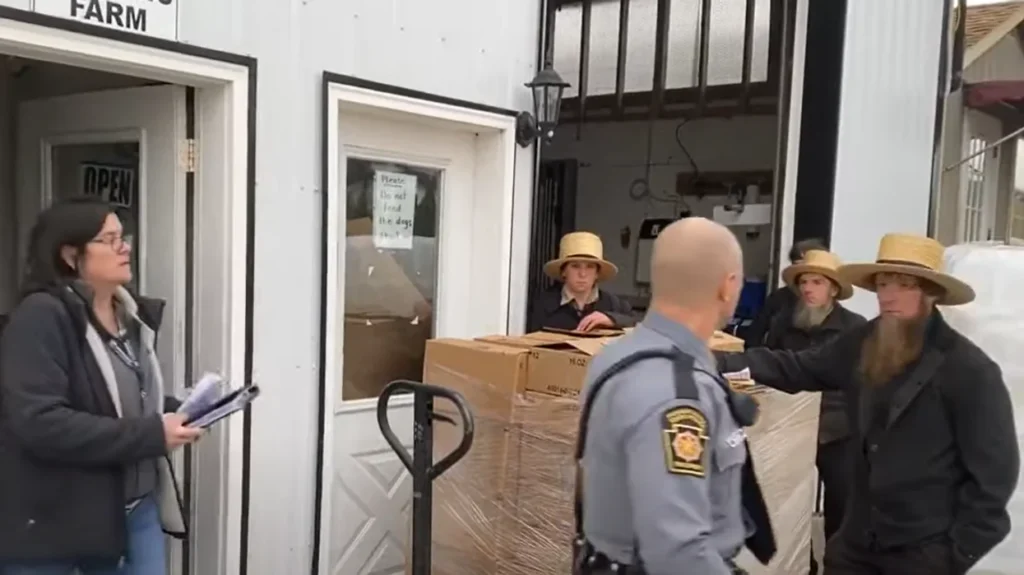
Multiple government agencies executed a search warrant on an Amish farm in Pennsylvania on Thursday. Government employees are seen on video hauling away several coolers of products from the organic farm. However, the lawyer for the farmer in question argues that the seizure of food was “patently illegal.”
Three Pennsylvania State Troopers and seven employees of the Pennsylvania Department of Agriculture conducted an hours-long search of a farm in Upper Leacock Township. Police are seen on video ordering a reporter from the Lancaster Patriot to exit the building while the search was conducted.
Video of the raid shows government employees seizing multiple coolers from the Lancaster County dairy farm owned by Amos Miller.
The news outlet reported that the search warrant was issued by Magisterial District Judge B. Denise Commins on Wednesday. The search warrant purportedly included an affidavit of probable cause completed by Sheri Morris – acting Bureau director of food safety with the Pennsylvania Department of Agriculture.
The Pennsylvania Department of Agriculture said it executed a search warrant as part of an investigation into two food-borne illness cases, according to Lancaster Online.
The potential cases stem from two underage individuals in Michigan and New York suffering illness after consuming raw eggnog and other raw dairy products from the Miller Organic Farm. Health officials in both states noted that the sickened individuals tested positive for Shiga toxin-producing E. coli.
The raid of Miller’s farm “sought, among other things, illegal raw milk and raw milk products, including eggnog,” the Pennsylvania Department of Agriculture said.
The government agency declared, “Miller has never licensed his retail operation.”
Rep. Thomas Massie (R-Ky.) said of the raid on the X social media platform: “Looks like Amos Miller’s farm is being raided. With all of the problems in society today, this is what the government wants to focus on? A man growing food for informed customers, without participating in the industrial meat/milk complex? It’s shameful that it’s come to this.”
Massie is the co-author of the PRIME Act bill that “makes it easier for small farms and ranches to serve consumers.”
“Consumers want to know where their food comes from, what it contains, and how it’s processed. Yet, federal inspection requirements make it difficult to purchase food from trusted, local farmers,” Massie said. “It is time to open our markets to give producers the freedom to succeed and consumers the freedom to choose.”
Miller’s attorney, Robert Barnes, proclaimed that the seizure of food was “patently illegal.”
Today, the Department of Agriculture of the State of Pennsylvania suddenly came, without notice, raided Amos’ farm, and detained everything Amos had in the farm’s freezer. They did so in a lawless manner, without appropriate authority, in violation of their own rules and regulations, despite never objecting to the prior resolutions reached with the federal government, and despite a complete failure by the state to even reach out to Amos’ known counsel, Robert Barnes. The state’s own rules require advance notice, reasonable time frames for inspections, and a showing of credentials, none of which occurred here. Instead, the state unlawfully obtained a search warrant, based on materially false statements in an affidavit by a high-ranking state official in an agency with a known grievance against independent farmers like Amos, and, after the raid and finding no evidence of wrongdoing, then illegally ordered detained every item of food in one of Amos Miller’s coolers, including buffalo meat not even subject to federal regulation. The detention order is patently illegal under Pennsylvania law. Despite the constant harassment, Amos will continue to do all he legally can to provide the food his members deeply need. Amos thanks you for your continued support at this critical time for food freedom in America.
Barnies issued a statement after the search was conducted:
Miller has been in legal battles with the government for years.
In 2016, the U.S. Food and Drug Administration scrutinized Amos over selling raw milk.
Two individuals suffered from listeriosis – one of whom died. Health officials traced the raw milk back to Miller’s Organic Farm.
The USDA came down hard on Miller for slaughtering farm animals without federal inspections of his operation. Miller argued that his farm only sold the meat to those with private club memberships to Miller’s Organic Farm, which he believed exempted him to federal regulations.
According to the Foundation for Economic Education, “The story reached a climax in March 2022 when a federal judge ordered Miller to cease and desist all meat sales and authorized armed U.S. Marshals to use ‘reasonable force’ to gain access to Miller’s farm so a court expert could inspect it.”
The expert and the U.S. Marshals took an inventory of all Miller’s meat on the premises.
Federal inspectors continue to investigate Miller’s farm every few months. However, Miller has often been in a standoff with the federal government over allowing inspectors on his farm.
The U.S. Department of Justice filed a civil action requiring Miller’s farm to comply with federal meat and poultry food safety statutes.
The Amish farmer initially faced fines from the government of $250,000.
Amish Farm Fined $250K, Facing Jail Time for Humanely Raising and Selling Food to Willing Customers
Mar 1
Amish Farm Fined $250K, Facing Jail Time for Humanely Raising and Selling Food to Willing Customers
Amos Miller and his family has been running Miller’s Organic Farm for over a century, providing willing and highly satisfied customers with milk, chicken, beef, and eggs. All of the food coming from Miller’s farm is beyond organic, humanely raised in a non-factory setting and the animals treated with dignity as they spend their entire lives naturally and stress-free out on pasture. By any moral standard, Miller’s farm is the leading example of what farming in America should look like.
Unfortunately, because Miller uses humane techniques and treats his animals well, this has put a government target on his back. Recently, federal Judge Edward G. Smith, imposed sanctions on his farm, ordering the family farm to pay over $250,000 in fines or go to jail. Because the Millers don’t use the USDA factory farm methods, this makes them non-compliant and thus an enemy of the state.
“In order to effect defendants’ future compliance, by making them aware of the seriousness of their violations and the consequences for future violations, defendants are ordered to pay to the United States, within 30 days of the date of entry of this Order — and pursuant to written instructions that the United States will provide to defendants—a fine of $250,000, or face further monetary and other penalties, possibly including imprisonment of Amos Miller,” the order says.
“Smith also ordered Miller to reimburse USDA’s Food Safety and Inspection Service (FSIS) for its enforcement costs, totaling $14,436.26. Miller has 60 days to make the reimbursement,” according to Food Safety News.
According to the USDA, the farm is not complying with USDA regulations on how to label and process their food. But Amos says the methods which they use pre-date the USDA and the farm and its members have a right to free assembly and the right to choose how their food is processed without the USDA dictating to them on how to do it.
Amos Miller and his family has been running Miller’s Organic Farm for over a century, providing willing and highly satisfied customers with milk, chicken, beef, and eggs. All of the food coming from Miller’s farm is beyond organic, humanely raised in a non-factory setting and the animals treated with dignity as they spend their entire lives naturally and stress-free out on pasture. By any moral standard, Miller’s farm is the leading example of what farming in America should look like.
Join Our Telegram Chanel Here: Ignore The Mainstream Media
Unfortunately, because Miller uses humane techniques and treats his animals well, this has put a government target on his back. Recently, federal Judge Edward G. Smith, imposed sanctions on his farm, ordering the family farm to pay over $250,000 in fines or go to jail. Because the Millers don’t use the USDA factory farm methods, this makes them non-compliant and thus an enemy of the state.
“In order to effect defendants’ future compliance, by making them aware of the seriousness of their violations and the consequences for future violations, defendants are ordered to pay to the United States, within 30 days of the date of entry of this Order — and pursuant to written instructions that the United States will provide to defendants—a fine of $250,000, or face further monetary and other penalties, possibly including imprisonment of Amos Miller,” the order says.
“Smith also ordered Miller to reimburse USDA’s Food Safety and Inspection Service (FSIS) for its enforcement costs, totaling $14,436.26. Miller has 60 days to make the reimbursement,” according to Food Safety News.
According to the USDA, the farm is not complying with USDA regulations on how to label and process their food. But Amos says the methods which they use pre-date the USDA and the farm and its members have a right to free assembly and the right to choose how their food is processed without the USDA dictating to them on how to do it.
To be clear, not a single one of the farm’s customers has filed a complaint. The USDA is unilaterally going after the farm for failing to use their approved slaughter houses which stress and harm the animals before they are killed. Even if an animal is pasture raised and cared for, the USDA requires it be loaded into a truck and hauled to one of its approved slaughter houses where it spends its last moments alive surrounded by death and corralled into tiny pens with other animals before being killed by a person who never raised it.
On the contrary, Amos, who is Amish, prays with the animals before they are sacrificed in peace on his farm.
According to the farm, their human and chemical-free methods are the reason people seek them out and join their private food club.
The ever increasing environmental toxins from the overuse of synthetic chemicals makes modern farming very questionable. The ethical part, consuming animal foods, leaves doubts in the minds of many. Members of our community have joined us because they have chemical sensitivities and only started to heal and thrive once they began consuming REAL nutrient dense foods. They depend on our farm foods. Members with a vegan background started enjoying animal foods again once they realized that the death of an animal doesn’t have to be cruel.
Now, Amos has been forced into a corner, facing the possibility of spending time behind bars and losing the farm which has been in his family for decades. The farm has to spend tens of thousands on an attorney to fight for them in court and have since launched a GoFundMe campaign to raise those funds.
If you’d like to help this farm continue to provide safe and human food to his many willing and happy customers, you can do so here.
Source/Credit : https://thefreethoughtproject.com/
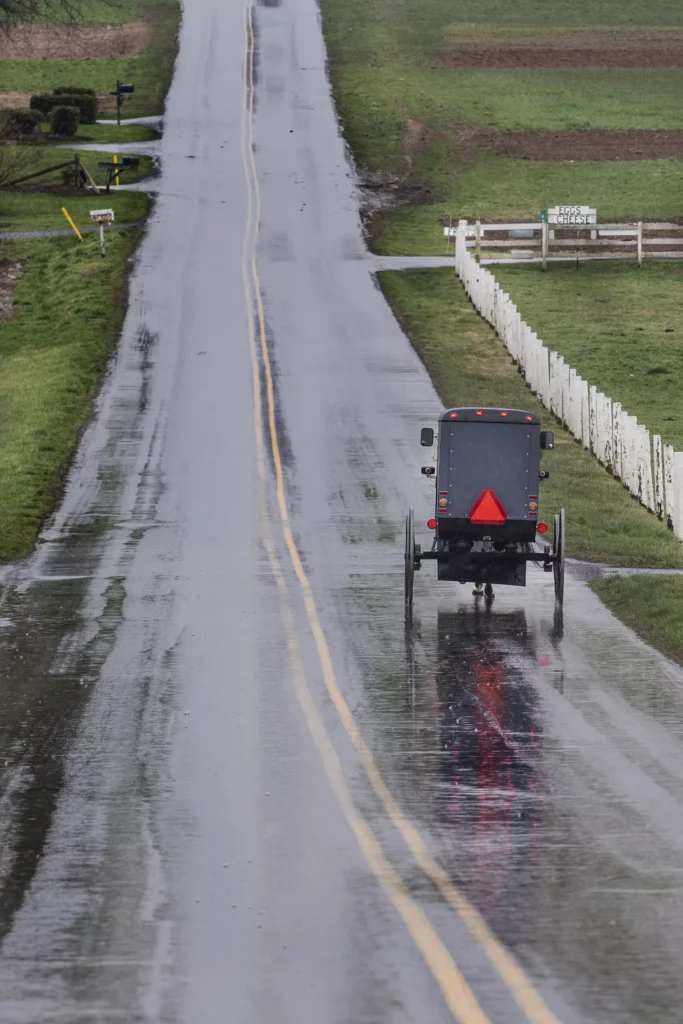
February 17, 2022 Jason Nark – The Philadelphia Inquirer
https://americanmilitarynews.com/2022/02/an-amish-farmers-600-guns-were-seized-its-unclear-if-he-broke-the-law/
Hand-painted signs in Amish country often advertise fresh eggs, shoofly pies or handmade quilts, but the Bureau of Alcohol, Tobacco, Firearms and Explosives is trying to determine whether one Lancaster County farmer’s sizable gun collection was also his side hustle.
An ATF spokesman said agents seized evidence during an “enforcement operation” on Jan. 12 at the Cattail Foundry in Leacock Township, Lancaster County, but declined to comment further. Two sources familiar with the investigation said approximately 600 firearms were seized during the operation.
On Wednesday morning, farm owner Reuben King declined to comment on the matter at his home, but he did talk to Lancaster Online several weeks ago. King told the news outlet he was a dairy farmer, first and foremost, but admitted selling “some” firearms from his personal collection to fellow Amish and a few non-Amish too.
Sources said handguns were among the weapons taken by ATF. King told Lancaster Online he mostly sold long guns, for hunting.
“I was not dealing in handguns, positively not,” King said last month.
The ATF said the investigation is ongoing but no charges have filed. King told the Inquirer he hadn’t hired an attorney.
The Amish, generally, do not pose for photographs and therefore, most don’t get the photo IDs needed to purchase firearms from licensed gun shops. Hunting rifles and shotguns, known as “long guns” can be sold privately between two parties without a background check or photo ID.
Joshua Prince, a Pennsylvania attorney who specializes in firearms law, said the ATF operation at King’s farm could lead investigators into a murky area. It’s not clear, he said, how many firearms an individual would have to sell in order for that person to be considered a firearms dealer. The ATF’s own web site said licenses are required for individuals who “repetitively buy and sell firearms with the principal motive of making a profit” but not for the “occasional sales of firearms from your personal collection.”
“It’s so vague and that’s going to be the government’s biggest hurdle,” Prince said. “It could turn out that they just say, ‘Listen, don’t do this again.’”
Prince, who is not affiliated with King’s case, sued the federal government in 2015 on behalf of an Amish man from Northumberland County, who felt he should have a religious exemption from the photo identification needed for a firearms purchase. Prince said he could not discuss the outcome of the case, but said any Amish person can produce all the documentation needed to get a photo identification in the first place.
“I think that’s unconstitutional,” Prince said of the photo requirement. “There is a way to prove our identity in the absence of pictures. We aren’t born with photo ID.”
U.S. Rep. Bob Gibbs, a Republican from Ohio, introduced a bill in December to allow the Amish to purchase guns without a photo ID.
Steve Nolt, an Elizabethtown College professor who has studied Amish society for decades, said the Amish aren’t a monolith and that customs and adherence to certain beliefs, about photography and use of technology, vary by location.
“I would say there’s a small number of Amish who get photo IDs,” he said.
At The Sportsman’s Shop, a large firearms dealer and gun range nine miles north of King’s home, a manager said plenty of Amish customers come in with photo ID, particularly during hunting season.
“We do sell a lot of new guns to the Amish,” the manager, who asked not to be identified.
There was no signage at King’s farm Wednesday that suggested he sold firearms there. A non-Amish man wearing a shirt in support of the Second Amendment was driving around the property, also looking to speak to him.
Most Amish families own a long gun, Nolt said, and their interest in hunting goes back centuries. That interest, however, has grown beyond sustenance.
”Hunting has also become a recreational sport for them,” he said. “They own hunting cabins up north. They take hunting trips.”
Nolt was surprised, however, at the sheer number of guns the ATF allegedly seized during the operation last month. He also said it’s unusual for the Amish to use or own handguns.
“There’s no real history of the Amish using guns for personal protection,” he said. “There would be a bit of a taboo with handguns.”
Amish Washday Casserole
Feb 17
Found this recipe and it looks interesting.
https://www.heraldbulletin.com/amish-cook-feb-16/article_70ab5978-8e68-11ec-b1b5-13bc3e134dad.html
WASHDAY CASSEROLE
INGREDIENTS
3 lbs. ground beef
3 onions (sliced)
3 cups sliced potatoes
3 cups cups sliced celery
3 cups cooked spaghetti
2 cans cream of mushroom soup
9 slices bacon
1 qt. tomato juice
1 lb. cheddar cheese
INSTRUCTIONS
Brown the beef and the onions in a pan, drain and pour in bottom of casserole dish.
Layer the potatoes, celery and spaghetti.
Pour the cans of mushroom soup over the mixture.
Fry the bacon and cut into small pieces and put on top.
Pour tomato juice over the bacon and then sprinkle cheese over the top.
BAKE AT 350 FOR 1 & ½ HOURS.
Horses Ticketed for pooping
May 25
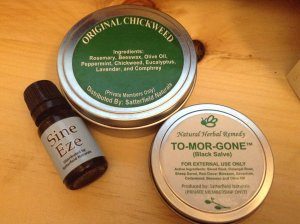 This is a terrible story of FDA over reach. Sam Girod, a simple Amish farmer was making a wholesome natural salve and got cross with the FDA on labeling. The FDA ended up charging him with felony drug distribution and interstate drug distribution. This is entirely crazy.
This is a terrible story of FDA over reach. Sam Girod, a simple Amish farmer was making a wholesome natural salve and got cross with the FDA on labeling. The FDA ended up charging him with felony drug distribution and interstate drug distribution. This is entirely crazy.
I am not going to write a lot about this because I think that the Family Cow Blog pretty much covered the story. Here is a link to that article:
http://www.icontact-archive.com/NGPZGNZ0MsM61WcVJ3rpFviZsxzbA9ul
Other links for more research
http://www.davidgumpert.com/2783-2
http://www.wkyt.com/content/news/WKYT-Investigation-Amish-farmer-in-jail…
http://www.kyfreepress.com/2017/01/fda-girod-indictment/
Please go sign the whitehouse petition to pardon this man.
https://petitions.whitehouse.gov/petition/free-ky-amish-farmer-samuel-girod

